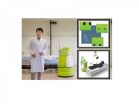Led by Arthur S. Levine, M.D., the University of Pittsburgh senior vice chancellor for the health sciences and John and Gertrude Petersen Dean of Medicine, medical school deans from 18 institutions reviewed the financial challenges that prevent high-risk, high-reward research, drive established investigators out of the U.S., and discourage trainees and early career researchers from pursuing their professional dreams.
"At any amount of public investment, the cost of the biomedical research enterprise is growing inexorably beyond what available resources can reasonably support," they wrote. "Persistent constraints on federal funding for biomedical research, including that from the U.S. National Institutes of Health (NIH), threaten to undermine the biomedical research enterprise, and decreasing clinical revenue compounds this threat."
Income from tuition fees, technology transfer, state grants and philanthropic gifts cannot make up for the loss of federal funds, Dr. Levine said. Furthermore, caps on federal reimbursement for administrative costs of research--which have risen significantly due to increased federal regulation--exacerbate the challenges. Academic institutions contribute on average an additional 53 cents for every dollar of sponsored research support received, typically with clinical revenue that is expected to decrease as the Affordable Care Act reduces health care costs.
"There is no question that academic institutions already have skin in the game to support the business of research, but we are doomed to be flayed without concomitant increases in federal funding," Dr. Levine noted. "One of the critical components of the U.S. economy is a biomedical enterprise that fosters discovery and invention of new therapies and technologies. The federal-academic partnership must be reinvented so that we can continue to lead research initiatives, deliver top-notch health care, and support the next generations of scientists."
One approach is a model in which the growth in appropriations to NIH and other research sponsors is predictable, accounts for inflation, and is projected over three to five years, allowing both federal and academic institutions to plan for the future rather than attempt to react to annual funding uncertainty, the writers said. Biomedical research efforts must equal what is needed to improve health care in accordance with the public's needs and demands; funding reductions, they noted, will lead to a smaller biomedical enterprise and slow clinical advances.
"We cannot underestimate the need for a vibrant research community to add to our scientific knowledge and bring innovation to clinical medicine," Dr. Levine said. "It is imperative to have a renewed commitment to provide the financial stability to achieve these goals."
INFORMATION:
Co-authors include:
Robert J. Alpern, M.D., dean and Ensign Professor, Yale University School of Medicine
Nancy C. Andrews, M.D., Ph.D., dean and vice chancellor for academic affairs, Duke University School of Medicine
Karen Antman, M.D., provost, Boston University Medical Campus, dean, School of Medicine
Jeffrey R. Balser, M.D., Ph.D., vice chancellor for health affairs, and dean, School of Medicine, Vanderbilt University
Jeremy M. Berg, Ph.D., associate senior vice chancellor for science strategy and planning in the health sciences, University of Pittsburgh
Pamela B. Davis, M.D., dean, School of Medicine, and senior vice president for medical affairs, Case Western Reserve University
J. Gregory Fitz, M.D., executive vice president for academic affairs and provost, dean, UT Southwestern Medical School
Robert N. Golden, M.D., dean, School of Medicine and Public Health, vice chancellor for medicine affairs, University of Wisconsin-Madison
Lee Goldman, M.D., executive vice president and dean of the Faculties of Health Sciences and Medicine, chief executive, Columbia University Medical Center
J. Larry Jameson, M.D., Ph.D., executive vice president, University of Pennsylvania for the Health System, dean, Raymond and Ruth Perelman School of Medicine, University of Pennsylvania
Vivian S. Lee, M.D., Ph.D., dean, School of Medicine, A. Lorris Betz Senior Vice President for Health Sciences, CEO, University of Utah Health Care
Kenneth S. Polonsky, M.D., Richard T. Crane Distinguished Service Professor, dean of the Division of the Biological Sciences and the Pritzker School of Medicine, executive vice president of medical affairs, University of Chicago
Marsha D. Rappley, M.D., dean, Michigan State University College of Human Medicine
E. Albert Reece, M.D., Ph.D., vice president for medical affairs, University of Maryland, John Z. and Akiko K. Bowers Distinguished Professor, and dean, University of Maryland School of Medicine
Paul B. Rothman, M.D., dean of the medical faculty, CEO, Johns Hopkins Medicine
Debra A. Schwinn, M.D., dean, Roy J. and Lucille A. Carver College of Medicine, University of Iowa
Larry J. Shapiro, M.D., Spencer T. and Ann W. Olin Distinguished Professor, executive vice chancellor for medical affairs, and dean, Washington University School of Medicine
Allen M. Spiegel, M.D., Marilyn and Stanley M. Katz Dean, Albert Einstein College of Medicine
About the University of Pittsburgh School of Medicine
As one of the nation's leading academic centers for biomedical research, the University of Pittsburgh School of Medicine integrates advanced technology with basic science across a broad range of disciplines in a continuous quest to harness the power of new knowledge and improve the human condition. Driven mainly by the School of Medicine and its affiliates, Pitt has ranked among the top 10 recipients of funding from the National Institutes of Health since 1998. In rankings recently released by the National Science Foundation, Pitt ranked fifth among all American universities in total federal science and engineering research and development support.
Likewise, the School of Medicine is equally committed to advancing the quality and strength of its medical and graduate education programs, for which it is recognized as an innovative leader, and to training highly skilled, compassionate clinicians and creative scientists well-equipped to engage in world-class research. The School of Medicine is the academic partner of UPMC, which has collaborated with the University to raise the standard of medical excellence in Pittsburgh and to position health care as a driving force behind the region's economy. For more information about the School of Medicine, see http://www.medschool.pitt.edu.
http://www.upmc.com/media
Contact: Anita Srikameswaran
Phone: 412-720-2058
E-mail: SrikamAV@upmc.edu
Contact: Gloria Kreps
Phone: 412-586-9764
E-mail: KrepsGA@upmc.edu

